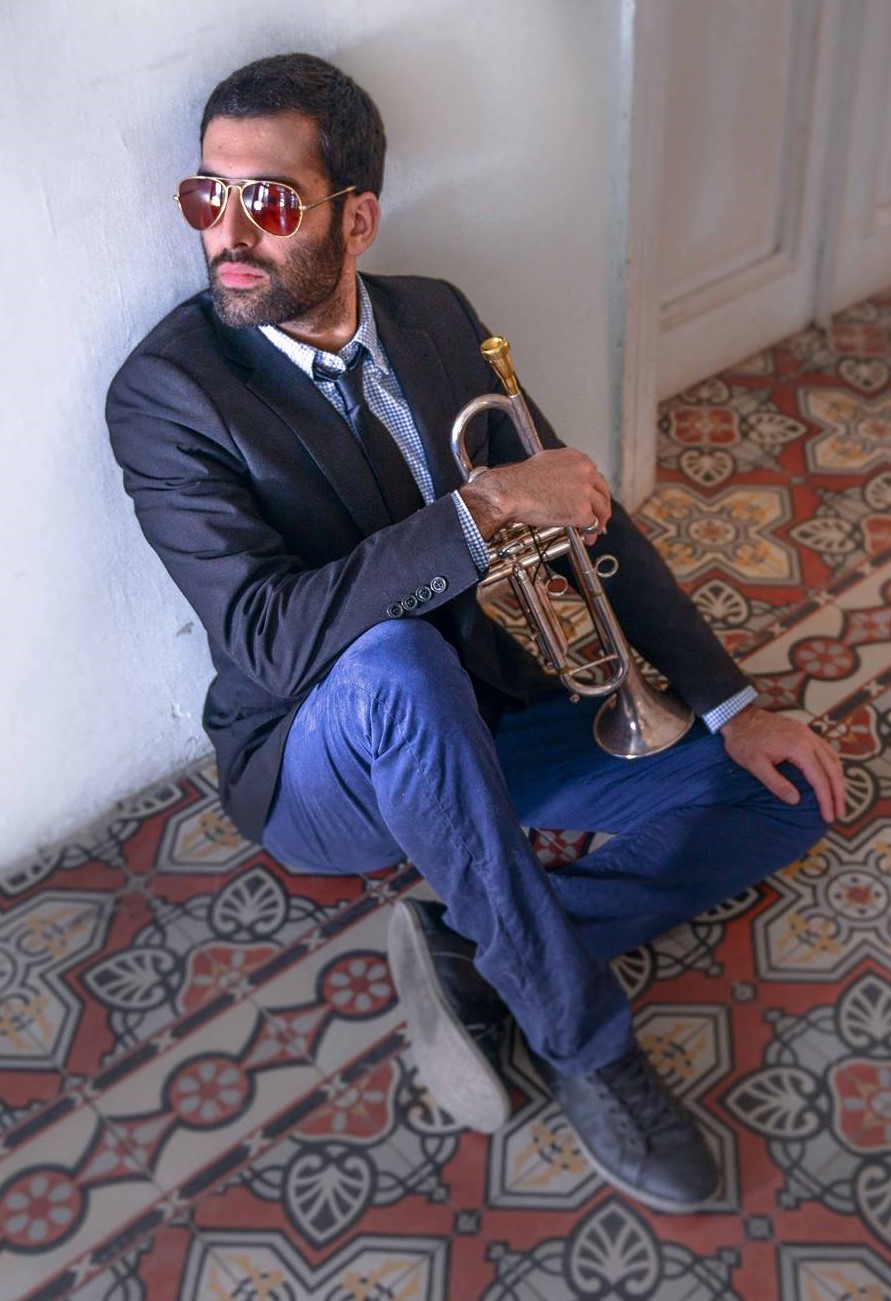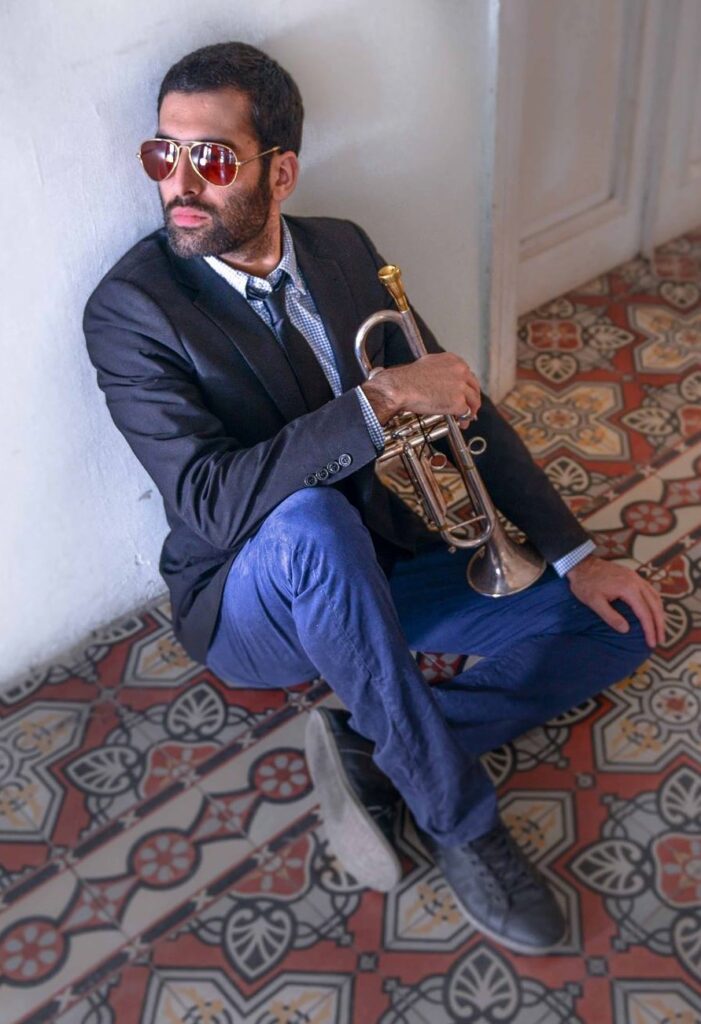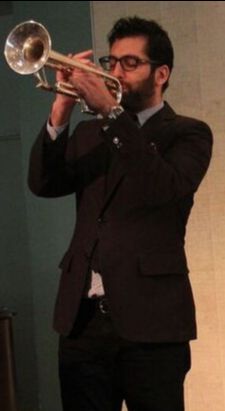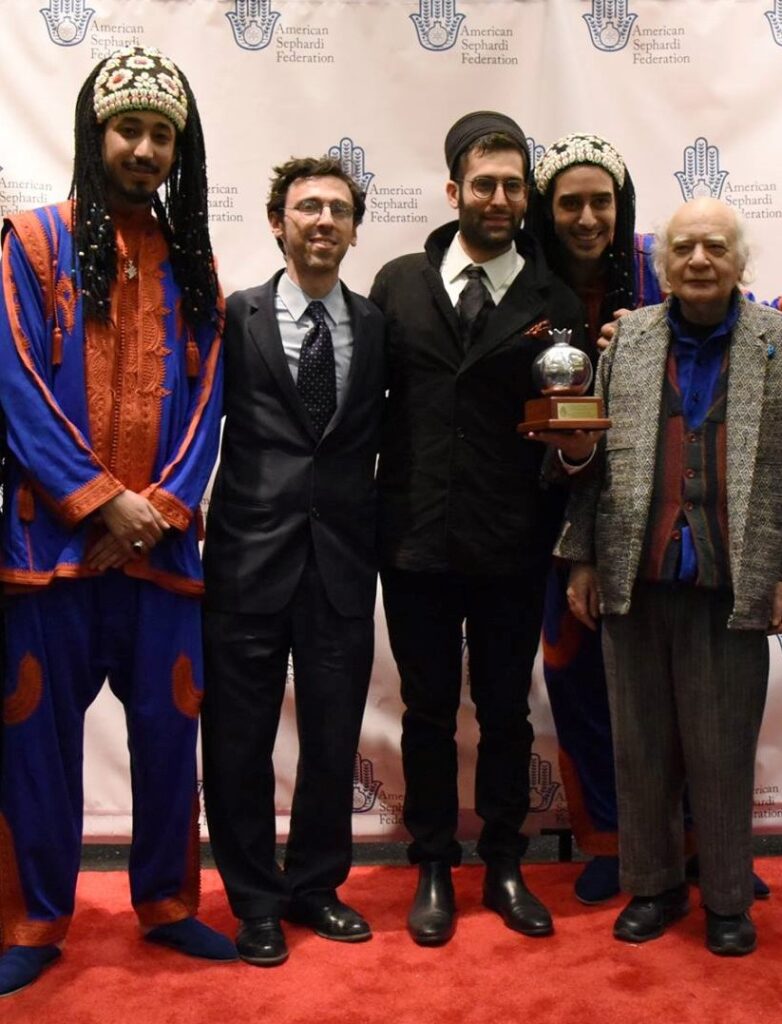Sacred Sounds of Sephardi Jazz: Celebrating Itamar Borochov

12 February 2021
All-star jazz musician, bandleader, and composer Itamar Borochov has enjoyed a very warm relationship with the American Sephardi Federation ever since he graciously agreed to perform at the ASF’s “Daniel Pearl Concert” in 2014 (memorably ahead of his debut at Dizzy’s Club — Jazz at Lincoln Center). In 2015, Itamar played at the opening of “Sephardic Journeys: An Evening of Exploration”; in 2016 he sat down for an interview with Sephardi Ideas Monthly, while the ASF’s Director of Publications, Dr. Aryeh Tepper, wrote the liner notes to Itamar’s second disk, Boomerang (see below); in 2017, he performed at the ASF’s inaugural American Sephardi Music Festival; then, in 2018, Borochov with Grammy-nominated Innov Gnawa was awarded the ASF’s Pomegranate Award for Musical Conservation, Creativity, and Coexistence at the 21st NY Sephardic Jewish Film Festival’s Moroccan Opening Night (video). With all that as background, the ASF was thrilled to learn that Itamar was honored this past week with the prestigious, “LetterOne Rising Stars Jazz Award.” Thrilled, but not surprised, because we’ve known for a while now that Itamar is, as they say, the real deal. And hazaq u’barukh, Alma and Itamar, on your wedding!
Click here to dedicate a future issue in honor or memory of a loved one.
Thank you to Sephardi World Weekly Patrons Professor Rifka Cook, Maria Gabriela Borrego Medina, Rachel Amar, Deborah Arellano, and Distinguished ASF Vice President Gwen Zuares!
Become a Patron today!

Feature ◊ Upcoming Events ◊ Sephardi Gifts ◊ Donate ◊ Sephardi Ideas Monthly ◊ ASF IJE ◊ Archive

“Immanuel Wilkins and Itamar Borochov Have Won the LetterOne Rising Stars Jazz Award”
By Nate Chinen, WBGO.org
Israel-born, Brooklyn-based jazz trumpeter, bandleader and composer, Itamar Borochov, was recently
honored with the prestigious “LetterOne Rising Stars Jazz Award.” Borochov is a profound artist whose
technical virtuosity is placed in the service of soulful storytelling that celebrates, “the traces of the
Divine that Borochov finds in elegant sophistication, Middle Eastern tradition and downhome blues”
(From the Liner Notes to Borochov’s second disk, Boomerang). In the words of celebrated critic Nate
Chinen, Borochov, “infuses state-of-the-art postbop with melodic elements from his Sephardic heritage.”
~~~~~~~
Feature:Borochov Receives the Rising Stars Jazz Award

Jump ahead to 38:00 to see jazz vocalist and living-legend, Dee Dee Bridgewater, present the LetterOne Rising Stars Jazz Award (European Edition) to Itamar Borochov. Bridgewater notes how Borochov’s influences include, “Middle Eastern and North African musics heard in his local synagogue,” while his unique approach brings, “the sacred sounds of his upbringing, Sephardic music, to a jazz setting.” After Borochov’s gracious acceptance speech, the ceremony then segues to a live recording of Borochov’s, “Wanderer Song,” a melody that originated among Bukharan Jews, emigrated to become a Hasidic niggun, and then assumed a new form in modern Israel as the popular tune, Mi Yitneni Oph (“If only I could fly”). At the end of the ceremony, Borochov joins Bridgewater, bassist Christian McBride, drummer Terri Lyne Carrington, Israeli-American pianist Tamir Hendelman, and saxophonist Immanuel Wilkins (also a prize recipient) for a swinging version of Thelonious Monk’s classic, “Blue Monk.”
~~~~~~~
“Revitalizing the Roots: An Interview with Itamar Borochov”
By Sephardi Ideas Monthly

(Photo courtesy of Irina Tsukerman)
Sephardi Ideas Monthly’s fascinating February 2016 interview with Itamar Borochov touched on the musical home of Borochov’s youth, his love of the blues, the influence of Israel’s piyyut revival and his love of piyyutim, as well as how all of this connects to Borochov’s artistic career as a jazz musician: “I have great respect and admiration and love for the traditional—traditional culture and music. I always look for the roots. That’s true of everything that I do.”
~~~~~~~
“Revitalizing the Roots: Liner Notes to Boomerang”
By Aryeh Tepper, Sephardi Ideas Monthly (Oct., 2016)

Chrystie Sherman)
As noted by the ASF’s Director of Publications, Dr. Aryeh Tepper, in his 2016 liner notes to Itamar Borochov’s disk, Boomerang, “Jazz from its inception was a musical hybrid, and by integrating Jazz
form and ‘ethnic music’ Borochov is extending the Jazz tradition out of the resources of the tradition
itself.” As Tepper continues, “In 2007, at the age of twenty-three, Borochov relocated to the States with
the intention of immersing himself in the Jazz tradition, but he received a wake-up call one day when
hard-bop icon Nathan Davis told him, “We want you to be you.” That’s when Borochov understood that
there’s no safety net, “I have to be real. If Coltrane was informed by his grandfather being a preacher,
I had to do the same thing. Lee Morgan’s from Philly and I’m from Jaffa. He brought gospel and I’m bringing Sephardi synagogue music.” To be clear, “Sephardi synagogue music” in this context stands
for all of the influences that Borochov absorbed growing up in a Bukharin-Jewish family in an ethnically
diverse town in Israel, synagogue music among them.”
~~~~~~~
Upcoming Events or Opportunities:
| The ASF Institute of Jewish Experience presents: The Persian Experience: Book Discussion with Roya Hakakian In Journey from the Land of No Roya Hakakian recalls her childhood and adolescence in pre-revolutionary Iran with candor and verve. The result is a beautifully written coming-of-age story about one deeply intelligent and perceptive girl’s attempt to find an authentic voice of her own at a time of cultural closing and repression. Remarkably, she manages to re-create a time and place dominated by religious fanaticism, violence, and fear with an open heart and often with great humor. Wednesday, 17 February at 12:00PM EST Sign-up Now!  Roya Hakakian is the author of Assassins of the Turquoise Palace and Journey from the Land of No, and has published two collections of poetry in Persian. Her essays have appeared in The New York Times and The Wall Street Journal, and on NPR’s “All Things Considered.” She has collaborated on programming for leading journalism units in network television, including 60 Minutes. She is the recipient of a Guggenheim Fellowship, and served on the editorial board of World Affairs. Since 2015, she has taught at THREAD, a writing workshop at Yale, and is a fellow at the Davenport College at Yale. She lives in Connecticut. Click here to read more about the book, “Journey from the Land of No”. Click here to find out more about our upcoming course, “The Persian Experience”. Sponsorship opportunities available: info@americansephardi.orgThe Sephardic Jewish Brotherhood of America and the American Sephardi Federation present: Dr. Albert Menache & The Holocaust in Salonika With Dr. Joe Halio A special book talk on the newly republished Memoirs of Dr. Albert Menache, one of the few survivors from the Jewish Community of Salonika. Birkenau (Auschwitz II) How 72,000 Greek Jews Perished was a ground breaking work by a Holocaust survivor and was one of the first testimonies written by a survivor published after World War II. Wednesday, 17 February at 7:00PM EST Sign-up Now! (Complimentary RSVP)  Joe Halio is a doctor of Geriatric Medicine based in Long Island. He is a board member of a number of Sephardic organizations, including: the American Sephardi Federation, the Sephardic Brotherhood of America, and the Foundation of the Advancement of Sephardic Studies and Culture. Click here to purchase your copy of “The Persian Experience”. Sponsorship opportunities available: info@americansephardi.orgSephardi Thought and Modernity 2021 Webinar Series A monthly lecture from February through June 2021, presenting different experiences of Sephardi modernization in different places and times. On Thursdays at 1:00PM EST (11:00AM MST) 18 February Almog Behar (Tel Aviv University): Between Judeo-Arabic, Literary Arabic and Hebrew in Jewish-Arab (Literary) Modernity 18 March Yaakov Yadgar (Oxford School of Global and Area Studies, University of Oxford): Sephardim in Israel and the critique of secularism 22 April Clemence Boulouque (Columbia University): In praise of the Orient: Elia Benamozegh’s Sephardic Modernities 20 May Gabriel Abensour (Hebrew University of Jerusalem): Rabbi Yosef Knafo’s Struggle for Democratization of Knowledge in Fin de Siècle Essaouira 17 June Yuval Evri (King’s College London) and Angy Cohen (University of Calgary): Foreign in a familiar land: language and belonging in the work of Jacqueline Kahanoff, Albert Memmi, and Jacques Derrida. Sign-up for the Webinar Series Now! (Complimentary RSVP)  The intention of this series is to spark the interest in processes of Jewish modernization not exclusively mediated by Europeanization. The questions we will be dealing with are related to non-dichotomic identities, multiplicity and loss of language, colonization, social transformation, and intellectual responses to it. We will approach these questions by looking at Jewish-Arab influences, the Sephardi response to European modernization, the responses of the rabbinic leadership and the work of Sephardi intellectuals. Series organized by Yuval Evri (King’s College London) and Angy Cohen (University of Calgary). There will be a change to Daylight Saving Time in March, so the event times in North America will remain the same, but the event time in your area may change, depending on your location. The start time on Feb. 18 is 11 a.m. (MST), 1 p.m. (EST), 6 p.m. (GMT), 7 p.m. (Madrid; GMT +1); on March through June events, the start time will be 11 a.m. (MDT), 1 p.m. (EDT).  The ASF Institute of Jewish Experience presents: The ASF Institute of Jewish Experience presents:The Persian Experience: Persian Music Workshop Explore Persian music with singer, creator, composer, and researcher Maureen Nehedar Sunday, 21 February at 12:00PM EST Sign-up Now!  About Maureen: Maureen Nehedar is an Israeli singer, creator, composer, and researcher. She has created a revival of Persian-Jewish tradition poetry (Piyutim). In August 2018 she released her new Piyyutim CD ‘Why do you stand afar’, in 2016 she released the CD ‘Gole Gandom’ and In 2014 she released the album “Asleep in the Bosom of Childhood’.In 2019 she won the Neve Shechter Prize and The Rabinovich Foundation for the Arts for Original Israeli Work. Click here to find out more about our upcoming course, “The Persian Experience”. Sponsorship opportunities available: info@americansephardi.orgThe ASF Institute of Jewish Experience presents: The Persian Experience: East and West – Can the Two Walk Together? Join us for an experiential workshop with poet Esther Shkalim where she will share about her life as a Persian Jew in Israel, accompanied by readings from her well-received works Sharkiya and What a Woman Must Know, published by Kinneret-Zemura-Bitan. As part of “The Persian Experience,” East and West: Can the Two Walk Together? (Amos 3:3) is a discussion with poet Esther Shkalim on a Mizrahi woman in a Western, secular society. Shkalim will discuss the following questions: How does a woman from a Mizrahi traditional patriarchal society contend with Western, modern, secular Israeli society? What is her relationship to the status of women in Mizrahi society, Orthodox society, and Israeli society? How does she approach the ethnic mosaic of Israeli society? Tuesday, 23 February at 12:00PM EST Sign-up Now!  About the speaker: Esther Shkalim is a poet of Persian heritage who researches Jewish diasporas of the East, with a focus on culture and community. Her two books, “Sharkiya” and “What a Woman Must Know” were published by Kinneret-Zemura-Bitan. In addition, she has published many poems in different books and journals, educational texts, and literary journals. Her poems are studied in universities, colleges and schools across Israel. Click here to find out more about our upcoming course, “The Persian Experience”. Sponsorship opportunities available: info@americansephardi.org Sephardic Culinary History with Chef Hélène Jawhara-Piñer Episode VII: Turrón and Conversos Sephardi Culinary History combines chef and scholar Hélène Jawhara-Piñer’s fascination with food studies and flair for creating delicious cuisine. Join along as she cooks Sephardic history! Sunday, 28 February at 10:00AM EST Sign-up Now! Pre-order your copy of “Sephardi: Cooking the History. Recipes of the Jews of Spain and the Diaspora, from the 13th Century Onwards” now ASF Broome & Allen Fellow Hélène Jawhara-Piñer earned her Ph.D in History, Medieval History, and the History of Food from the University of Tours, France. Chef Hélène’s primary research interest is the medieval culinary history of Spain through interculturality with a special focus on the Sephardic culinary heritage written in Arabic. A member of the IEHCA (Institute of European History and Cultures of Food), the CESR (Centre for Advanced Studies in the Renaissance), and the CoReMa Project (Cooking Recipes of the Middle Ages), Chef Hélène has lectured at Bar-Ilan University (in collaboration with the Stali Institute and the Spanish National Research Council (CSIC): “El patrimonio culinario judío de la Península Ibérica a través de un manuscrito del siglo XIII. Ejemplos de la pervivencia de recetas en la cocina de los sefardíes de España y de Marruecos,” 2018), as well as at conference of the Association Diwan (“Reflections on the Jewish heritage according to the Kitāb al-ṭabīẖ,” 2015), IEHCA of Tours (“Jews and Muslims at the Table: Between coexistence and differentiation: state of affairs and reflections on the culinary practices of Jews and Muslims in the Iberian Peninsula and in Sicily from the 12th to the 15th century,” 2017), and Society for Crypto-Judaic Studies (“The hidden Jewish culinary heritage of the Iberian Peninsula through a manuscript of the 13th century. Examples of the provenance of some recipes in Venezuelan and Colombian cuisine,” 2017). In May, Chef Hélène hosted “Shavuot in the Sephardic Kitchen: Bread of the Seven Heavens,” one of the most popular sessions of the Great Big Jewish Food Fest. Her recipes have appeared in the Sephardi Ideas Monthly, Sephardi World Weekly, Tablet Magazine, The Forward, and S&P Central’s Newsletter. Chef Hélène is currently writing a scholarly book and accompanying cookbook on the Jewish culinary history of Spain. Sponsorship and Naming opportunities available: info@americansephardi.orgThe ASF Institute of Jewish Experience presents: The Persian Experience: Uprooted from Iran with Sharona Mizrahi In this part of “The Persian Experience” series, Sharona Mizrahi shares her personal story Sunday, 28 February at 12:00PM EST Sign-up Now!  About the speaker: Sharona was born in Kerman, Iran. Her great-grandparents came from Hamadan and Yazd. Sharona’s great-grandparents escaped the famine of 1917-1920 in Hamadan, the city mentioned in the Book of Esther as Hegmatana or Ekbatana, the capitol of the Persian Empire during Acheshverosh’s regime. Sharona’s oldest brother, Kurosh, has traced her family’s lineage back six generations. Sharona attended public school in Iran until her first year of high school. Then in 1984, she, along with two sisters and one brother Z”L, escaped from Iran. One night in August, two weeks prior to Rosh Hashanah, smugglers arrived in the middle of the night and the Mizrahi family dropped everything and left their house to escape. In this talk, Sharona will give a brief history of her family and their one-year journey to the United States. Click here to find out more about our upcoming course, “The Persian Experience”. Sponsorship opportunities available: info@americansephardi.orgThe ASF Institute of Jewish Experience presents: New Works Wednesdays In our extended New Works Wednesdays series, Daniel Tsadik discusses his new book, “The Jews of Iran and Rabbinic Literature: New Perspectives.” Dr. Tsadik’s book addresses the question of Iranian Jewry’s familiarity with rabbinic literature from the 16th century to the beginning of the 20th century. Many of the book’s theses challenge and revise prevailing views that see this Jewry as largely isolated from world Jewry and its rabbinic legacy. Wednesday, 3 March at 12:00PM EST Sign-up Now!  About the author: A Fulbright scholar, Dr. Daniel Tsadik obtained his PhD in 2002 from the Yale University History Department. He authored several articles, a book entitled “Between Foreigners and Shi‘is: Nineteenth-Century Iran and its Jewish Minority” (Stanford University Press, 2007), another book entitled “The Jews of Iran and Rabbinic Literature: New Perspectives” (2019) which won the (Israel) Prime Minister Prize, and co-edited the book “Iran, Israel and the Jews: Symbiosis and Conflict from the Archaemenids to the Islamic Republic” (2019). From 2008 to 2020, Professor Tsadik taught at Yeshiva University, where he served as Associate Professor of Sephardic and Iranian Studies. His current research is on Shi‘ite-Jewish polemics. Order your copy of “The Jews of Iran and Rabbinic Literature: New Perspectives” now Sponsorship opportunities available: info@americansephardi.org  The ASF Institute of Jewish Experience presents: The Persian Experience Course opens on 28 February Sign-up now! Jews lived in the Middle East, and particularly Iran, even before the advent of Islam. Iran has a long history with varying dynasties, dynastic changes, and evolving borders and Jews have been there continuously throughout these changes. Throughout the ascent of Islam in its different forms, Jews were integrated at times more and at times less economically. There were times of intellectual and spiritual growth as well as suppression and persecution. All this will be addressed and discussed in a historical context. The course is divided into seven units: 1. The Ancient Period – the settlement of the Jews in Iran, Acaemenid, Parthian, and Sassanian times 2. 7th to 9th Centuries – The emergence of Islam, Islam and the Jews, Dhimma, and Jewish religious streams 3. 13th to 18th centuries – Mongols, Jewish Persian poets, Safavid times 4. Mid-18th century to 19th century – Invasion, dynasties, and persecutions 5. The latter part of the 19th century – Interactions with World Jewry, legal status and conversions 6. Early 20th century – Modernization and education, constitution revolution, Zionism 7. The 20th century – Pahlavi dynasty, Revolution, Mashadis, and Migration Dr. Daniel Tsadik Dr. Daniel Tsadik, a former professor of Sephardic and Iranian Studies at the Bernard Revel Graduate School of Jewish Studies, has been awarded The Prime Minister’s Prize (Israel) in 2020 for the Encouragement and Empowerment of Jewish Communities in Arab Countries and Iran for The Jews of Iran and Rabbinic Literature: New Perspectives, published by Mosad Ha-Rav Kook. Tsadik researches the modern history of Iran, Shi’ah Islam, and Iran’s religious minorities. A Fulbright scholar, he earned his Ph.D from the History Department at Yale University. Dr. David Yeroushalmy Born in Tehran, David Yeroushalmy completed his primary and part of his secondary education at the Alliance Israelite school in Tehran. He immigrated to Israel in 1961 and upon completing his secondary education he enrolled in the Department of Middle Eastern History at the Hebrew University of Jerusalem. Completing his B.A. in Middle Eastern Studies and in Political Science, he served in the Israeli Army as an officer. He pursued his doctoral studies at Colombia University New York, in the Department of Middle East Languages and Cultures. He specialized in Persian and Hebrew languages and literatures. D. Yeroushalmy was appointed lecturer in the Department of Middle Eastern and African History at Tel-Aviv University, where he has been teaching Persian language and Iranian history and culture. His Book entitled The Judeo-Persian Poet Emrani and His Book of Treasure, was published by E.J. Brill Publishers, Leiden, in 1995. Dr. Yeroushalmy’s current research focuses on the communal and cultural history of Iranian Jewry in the course of the nineteen-century. Ms. Lerone Edalati Lerone Edalati is a member of the Mashadi community of New York. In addition to her role as Associate Director of Donor Relations at ISEF, she researches and records the history and current practices of the Mashadi Jews. She holds a BA from NYU in Middle Eastern & Islamic Studies, and an MA in Middle Eastern Studies from The Graduate Center, CUNY. She is a Broome & Allen Fellow at the American Sephardi Federation and is currently gathering oral histories of Iranian Jews in NY. Dr. Hilda Nissimi Dr. Hilda Nissimi is the chair of the Generatl History Department at Bar Ilan University. Her most current research focuses on the formation adn change of identity layers in crypto-religious communities, with a particular focus on Mashadi Jews. Her book, The Crypto-Jewish Mashadis, was published in 1985 and remains the main text on the study of that population. She has written numerous articles on identity and forced conversions. This course is made possible with the support of The Shazar Center, Israel. For more information and other ASF IJE online course offerings visit: https://courses.instituteofjewishexperience.org/Sponsorship opportunities available: info@americansephardi.org  The ASF Institute of Jewish Experience presents: The Crypto Experience The Global History of Secret Jews An online course presented in 10 minute episodes. Learn at your own pace. Please sign-up now! Total cost of the course is $75.00 The ASF Institute of Jewish Experience is proud to present “The Crypto Experience,” an online course on Crypto-Jews. It is part of a series of online courses on a variety of topics that make up the robust Jewish experience. For hundreds of years there have been descendants of Crpto-Jews, who have covertly kept some of their traditions while maintaining a very different public persona. It is a question of identity, be it Huegenot, Catholic, Sephardi, or Mashadi. Professing one faith on the outside and another on the inside speaks to our quest for defining identity today. These questions of identity that we think are so new and so relevant are really rather old questions under different circumstances. In this course Dr. Hilda Nissimi (Bar Ilan University) presents an overview of crypto societies historically and in the context of today. She challenges the participants to ask themselves difficult questions like: What defines identity? If I project this outer self, how do I keep my real me? Who is the real me? Am I the me before the expression of an outer facade? Is it a new me? The course discusses these questions as they pertain to Jews, specifically. What does it mean to be a Jew? What do I have to keep if I want to call myself a Jew? Am I allowed to change? Am I the person to decide? Who will decide? How can anyone decide under such circumstances? In order to understand this in historic and cultural contexts, world-renowned scholars and experts in the field have joined Dr. Nissimi and will be presenting the challenges facing a range of crypto societies: Huegenots – Dr. Hilda Nissimi Spanish-Portuguese Crypto Society – Dr. Ronnie Perelis (Yeshiva University) Bildi’in of Morocco – Professor Paul Fenton (Sorbonne Université, Paris) Mashhadi Jews of Iran – Dr. Hilda Nissimi Tracing Jewish Roots – Genie and Michael Milgrom Growing Up Mashhadi– Reuben Ebrahimoff For more information and other ASF IJE online course offerings visit: https://courses.instituteofjewishexperience.org/  The ASF Institute of Jewish Experience presents: The Greek Experience Explore the world of Greek Jewry from the ancient Romaniote to the Sephardim and others who made it to and through Greece. An online course presented in 10 minute episodes. Learn at your own pace. Please sign-up now! Total cost of the course is $75.00 Jews have been in Greece since before the Temple was destroyed. They were in Greece upon the founding of the Greek Orthodox Church. Community members, known as Romaniote, made their way through Venice, Byzantium, Spain, across the Ottoman Empire, and beyond. Dr. Yitzchak Kerem provides an overview of the unique languages, liturgical nuances, and communal life of Jews across Greece. Dr Kerem spent significant time living in Greece and researching Greek and Sephardic history. Photographs, maps, and personal accounts provide course participants with a full picture of the unique nature of the Jews of Greece and its surroundings. In the course, participants will look at major influential points in Greek Jewish history. They will explore The Golden Age of Salonika, a time when Greece’s northern city was a hub of Jewish scholarship. Kerem introduces the tension arising in the Greek Jewish community because of Shabtai Tzvi and the Sabbateanism movement that brought with it false messianism and conversion to Islam, at least outwardly. The course looks at when the Alliance Israélite Universelle moved in and the Sephardic culture in Greece developed a rich secular culture with its own novels, theater, and music. This is part of the greater Jewish heritage and history that is often overlooked. ASF IJE online courses will bring to life all parts of the greater Jewish Experience. For more information and other ASF IJE online course offerings visit: https://courses.instituteofjewishexperience.org/ |
| Please donate now via PayPal to support the American Sephardi Federation! With your generous, tax-deductible donation, the ASF can cultivate and advocate, preserve and promote, as well as educate and empower! For more information about sponsorship opportunities: email or leave a message at 212.294.8350. To donate by mail, please send a check payable to “American Sephardi Federation,” 15 W 16th St., New York, NY, 10011 Together, we can go from strength to strength in the New Year! |
| Copyright © 2021 American Sephardi Federation, All rights reserved. Thank you for opting (on our websites, at an event, or by email) to receive American Sephardi Federation Programming Updates and Publications. We apologize if this message was sent in error. The American Sephardi Federation is located at the Center for Jewish History (15 West 16th Street, New York, New York, 10011). www.AmericanSephardi.org | info@AmericanSephardi.org | (212) 294-8350 unsubscribe from this list update subscription preferences |